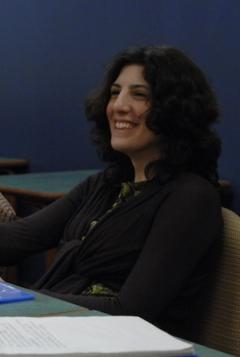Ashbrook Masters Graduate Now On Summer Faculty
December 24, 2020

Ashbrook’s Master of Arts in American History and Government offers an unusual breadth of courses to secondary school teachers who want to build their knowledge of American history and government. “We do this by hiring the best faculty we know from colleges and universities across the country,” says program Co-Director Christopher Burkett. These professors travel to the Ashland University campus to teach intensive summer courses covering each period of our nation’s history. So it’s no small thing that the program asked Sarah Morgan Smith, who earned her Masters in the program in 2009, to co-teach this summer’s course on Colonial America.

Smith, who is completing PhD work in political theory at Rutgers University, has deeply researched the thought and experience of colonial Puritans. To complete her Masters, she studied a vein of Calvinist thinking that helped prepare the ground for our Revolution. She located the sermons of a Calvinist minister who advocated the American Revolution, arguing from his pulpit that the American people were “predestined for liberty.” Her well-argued analysis challenged the general scholarly view that the Founders’ generation distanced themselves from Calvinist orthodoxy.
Her PhD dissertation will show how New England Puritans helped Americans formulate another political concept important to the Founders: civic education. The idea that citizens must be educated to practice the virtues that support civic life might be seen as a necessary corollary to the revolutionary impulse. “The Founders knew they needed to perpetuate an attitude of mind that would support a democratic republic,” Smith says, and that attitude was not one of unbridled pursuit of personal desires. People who governed themselves would need habits of self-restraint and responsibility; they would also need to practice rational deliberation.
In arguing that the Puritans helped shape this element in the Founders’ thinking, Smith again challenges the general scholarly view, which credits ideas about civic education to the British Whig tradition. Smith disagrees, seeing “something uniquely American about the way we think of ourselves as a people with shared responsibilities to the political community; this goes back to the Puritan period. John Adams, in fact, credited the Puritans with developing this idea of civic life.”
Smith will co-teach this summer’s Masters course on colonial America with David Tucker, who advised her on her Masters thesis. Although he was originally skeptical, Tucker says Smith convinced him “that Calvinist orthodoxy was indeed compatible with the natural rights thinking of the Revolution.”
Although Smith has been teaching undergraduates at Rutgers and at Montclair State University for several years, she says she must gear up to teach in Ashbrook’s MAHG program. “I have so much respect for the professors in the program, having been their student. I really have to put my game face on!”

